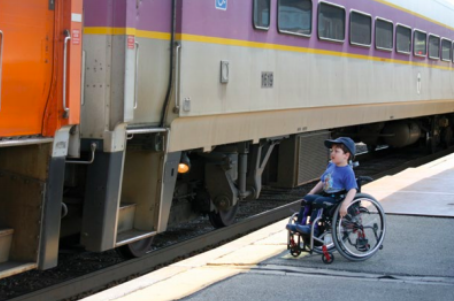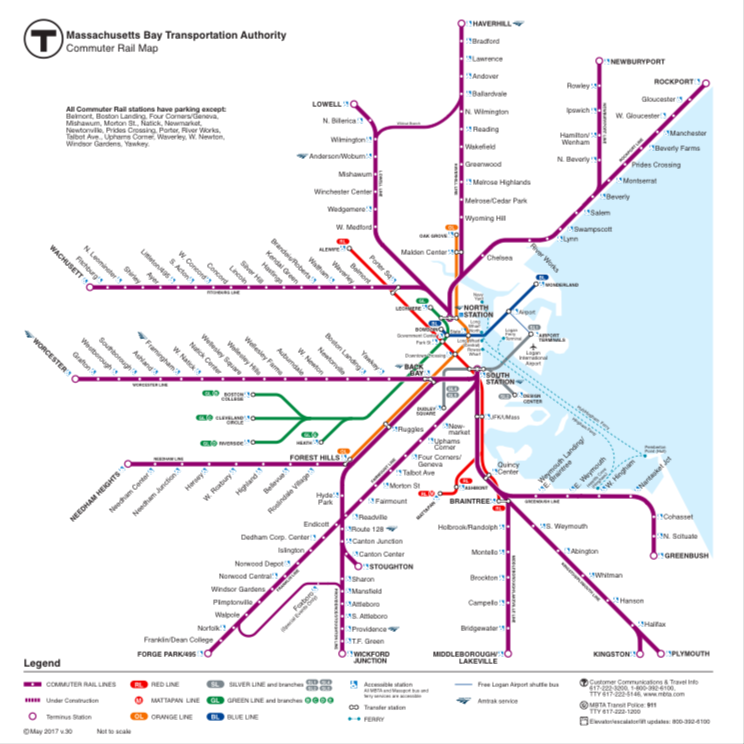Boston commuter rail has the pieces for an expansive modern system. What it needs isn't a big extension, but a fresh approach to service.
That's according to a new report from local advocacy group Transit Matters.
The 398-mile MTBA Commuter Rail system carries an unremarkable 130,000 passengers a day. But that's not surprising given its slow and limited service.
Transit Matters has proposed a $2-3 billion "Regional Rail" overhaul that would make it much more useful.
Here is what the group proposes:
1. Increase service
Boston commuter rail provides patchy, irregular service. Transit Matters staffer Jarred Johnson says some lines have mid-day service gaps as long as three or four hours. Or a line might offer service only once every two hours after 7 p.m. Some trains don't run at all on weekends. As a result the network is of limited usefulness.
“Our current Commuter Rail system is a vestige of mid-20th century thinking, based on an antiquated assumptions about the kind of mobility choices people expect to have," said Transit Matters president and co-founder Marc Ebuña in a statement. "Many people today do not have 9 to 5 jobs; they require more flexibility from their transit system."
Transit Matters proposes more regular service between 6 a.m. and midnight. To be useful, Regional Rail should operate at least every 30 minutes in the suburbs and at least every 15 minutes in the city.
2. Electrify the system
The current system needs a technical revamp as well. With an operating cost of $400 million a year, MBTA fiscal management chair Joe Aiello recently said the current system "costs way too much for too little ridership."

Transit Matters says the system should be converted from diesel to electric power. It costs MBTA $544 per hour to operate each car it runs on commuter rail -- much higher than $311 per hour for Philadelphia regional rail, which is electrified.
Transit Matters says the system should be electrified line by line. One route -- the Providence Line -- is already partly electrified already for Amtrak service. The region could begin the process by completing its electrification.
Many Boston rail cars are in need of replacement. When they are finally aged out, says Transit Matters, they should be replaced with electric ones.
Transit Matters also calls for station revamps that would offer level boarding. The group estimates that electrification combined with level boarding would cut travel times on most lines by 40 percent.
3. Free Transfers
The regional rail system should be seamlessly integrated into the larger transit system to better serve riders, especially those with lower incomes. Without fare integration, transferring from Commuter Rail to the subway could cost one rider as much as $9.50. With free transfers, the price would come down to $2.75.
Local experience shows fare integration can be a powerful tool to encourage ridership. MBTA's Fairmount Line, for example, saw ridership triple since 2012, when it was moved into "Zone A," which allows riders to pay the same fare as they would for the subway.
4. North-south rail link
Finally, a modern "Regional Rail" system shouldn't be a hub and spoke model. A subway-style system would broaden access to the city. That would require the construction of a north-south rail link connecting North Station and South Station, an idea that has been bandied about in Boston for a long time.
This feature would take 10 to 20 years to construct, and is not included in Transit Matters' $2-3 billion estimates. But it would be an important final step to making the Regional Rail system rider-friendly. It would allow, for example, riders to commute from the northern suburbs to the Back Bay and Financial District.
But the North-South rail link might not be worth it without other steps to boost ridership, said Johnson.
Federal funding for city transit projects is uncertain at this point. Transit Matters says Massachusetts should fund the proposal, if necessary. It could bond against future cost savings to generate some of the funding.
Ultimately, this kind of investment could help "draw the region closer together," Transit Matters says, expanding job access for people in working class suburbs and relieving pressure on the highway system.






